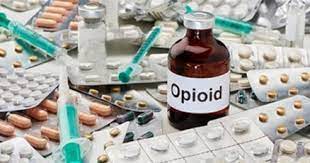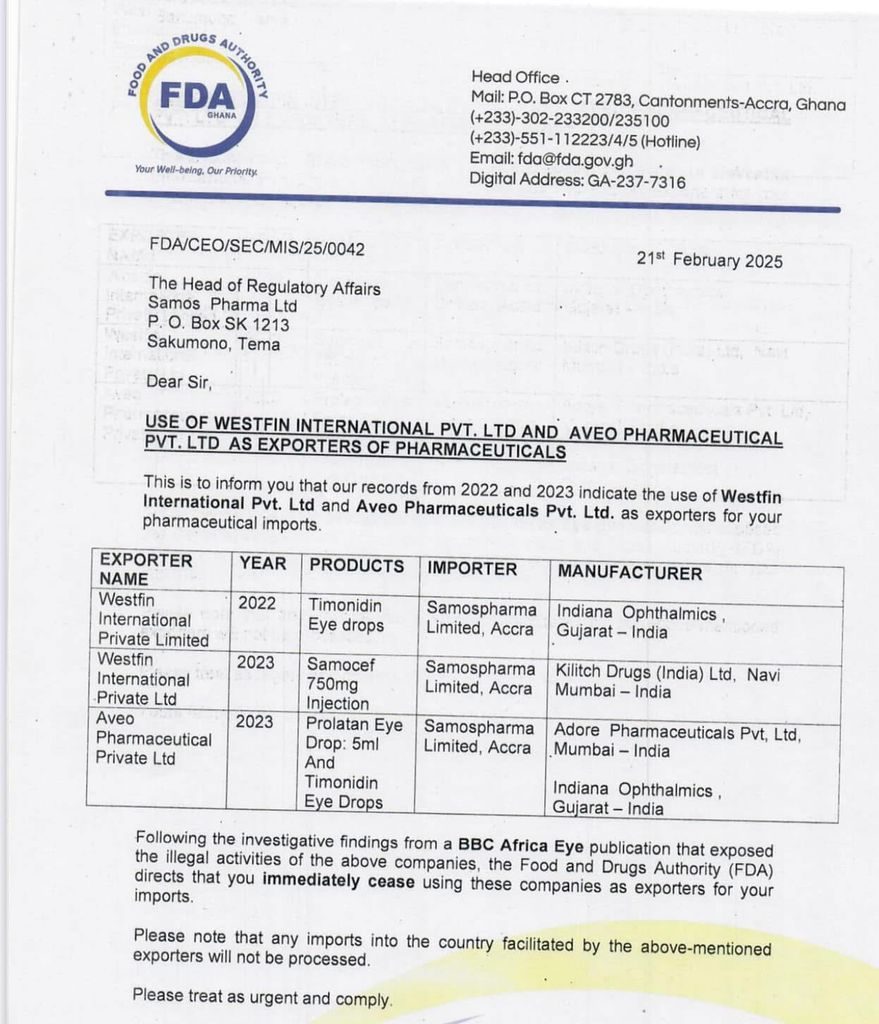Ghana’s Opioid Scandal: FDA Records Contradict Samospharma’s Denials
A major twist has emerged in Ghana’s unfolding opioid scandal as official documents from the Food and Drugs Authority (FDA) reveal that Samospharma Limited—a company at the center of an investigative report by BBC Africa Eye—has indeed engaged in business transactions with two Indian pharmaceutical exporters previously implicated in illicit drug shipments.
The new revelations directly contradict Samospharma’s official denial of any business relationship with Aveo Pharmaceuticals Pvt. Ltd. and Westfin International Pvt. Ltd., raising fresh concerns about transparency in Ghana’s pharmaceutical sector.
FDA Records Challenge Samospharma’s Response
In response to allegations made by BBC Africa Eye and a set of 12 direct questions posed by NorvanReports, Samospharma categorically denied any past or present business relationship with Aveo Pharmaceuticals Pvt. Ltd. and Westfin International Pvt. Ltd. The company stated unequivocally:
“Samospharma or any of its affiliates have no business relationships, past or present, with Aveo Pharmaceuticals, PRG Pharma, or Westfin.”
However, a letter dated February 21, 2025, issued by the Ghana Food and Drugs Authority (FDA) and addressed to Samospharma’s Head of Regulatory Affairs, confirms otherwise. The FDA’s records from 2022 and 2023 indicate that Samospharma imported pharmaceutical products from Aveo Pharmaceuticals Pvt. Ltd. and Westfin International Pvt. Ltd. The listed imports include:
- 2022: Timonidin Eye Drops (Westfin International Pvt. Ltd.)
- 2023: Samocef 750mg Injection (Westfin International Pvt. Ltd.)
- 2023: Prolatan Eye Drop (5ml) and Timonidin Eye Drops (Aveo Pharmaceuticals Pvt. Ltd.)
These products were manufactured by Indiana Ophthalmics (Gujarat, India), Kilitch Drugs (Navi Mumbai, India), and Adore Pharmaceuticals (Mumbai, India).
Regulatory Action: FDA Issues Ban on Further Imports
The FDA Ghana has taken swift action, directing Samospharma to immediately cease using these two companies as exporters for pharmaceutical imports. The regulatory body has also warned that any future shipments facilitated by Aveo Pharmaceuticals Pvt. Ltd. and Westfin International Pvt. Ltd. will not be processed.
This intervention comes in the wake of BBC Africa Eye’s investigative findings, which accused these Indian pharmaceutical exporters of involvement in the illicit opioid trade across West Africa. The FDA’s action raises pressing questions about the extent of Ghana’s exposure to unregulated pharmaceutical imports and whether Samospharma knowingly engaged with these firms despite regulatory concerns.
Samospharma’s Legal Threats & Contradictions
Samospharma had previously threatened legal action against BBC Africa Eye, claiming the documentary made false, defamatory, and scandalous allegations. The company’s official press release on February 23, 2025, stated:
“We categorically deny the false allegations in the BBC Africa Eye report regarding unlicensed opioid imports. These claims are baseless and defamatory. We suspect fraudulent use of our corporate identity and a clear case of criminal impersonation.”
However, the FDA’s new disclosures call into question the credibility of this defense. The fact that government records confirm transactions with the very same exporters accused in the BBC report raises concerns over Samospharma’s transparency and accountability.
Critical Questions Arise
With these new revelations, several key questions demand urgent answers:
- Why did Samospharma deny any business relationship with Aveo Pharmaceuticals and Westfin International despite FDA records proving otherwise?
- Were the imported pharmaceutical products limited to the eye drops and injections listed in the FDA letter, or were there other undisclosed shipments?
- Did Samospharma knowingly mislead the NorvanReports team and the public, or was this a case of incomplete disclosure?
- How will the Ghanaian government and other regulatory bodies respond to this apparent contradiction between Samospharma’s claims and official import records?
- Could we believe the FDA also on this claim since no evidence was attached?
Industry Fallout & Potential Legal Consequences
The unfolding controversy is likely to trigger further scrutiny from Ghana’s regulatory agencies, with potential legal and reputational consequences for Samospharma.
- If the company knowingly misled regulators, it could face severe sanctions, fines, or legal repercussions.
- If criminal impersonation was indeed a factor, as Samospharma previously claimed, then an independent investigation must be launched to identify how the company’s name was linked to these transactions.
- The BBC’s credibility in this case has now been reinforced, as their initial reporting aligns with the evidence presented in the FDA’s letter.
What Comes Next?
This latest development underscores the urgency of greater regulatory oversight in Ghana’s pharmaceutical industry. As the FDA’s directive takes effect, it remains to be seen whether:
- Samospharma will provide an updated statement explaining this contradiction.
- Ghana’s CID will investigate the possibility of fraudulent use of import licenses.
- Further evidence will emerge linking other pharmaceutical firms to illicit opioid trade networks in West Africa.
For now, the spotlight remains firmly on Samospharma, as industry observers, regulators, and legal experts await their next move.
NorvanReports will continue to follow this story as new developments unfold.









